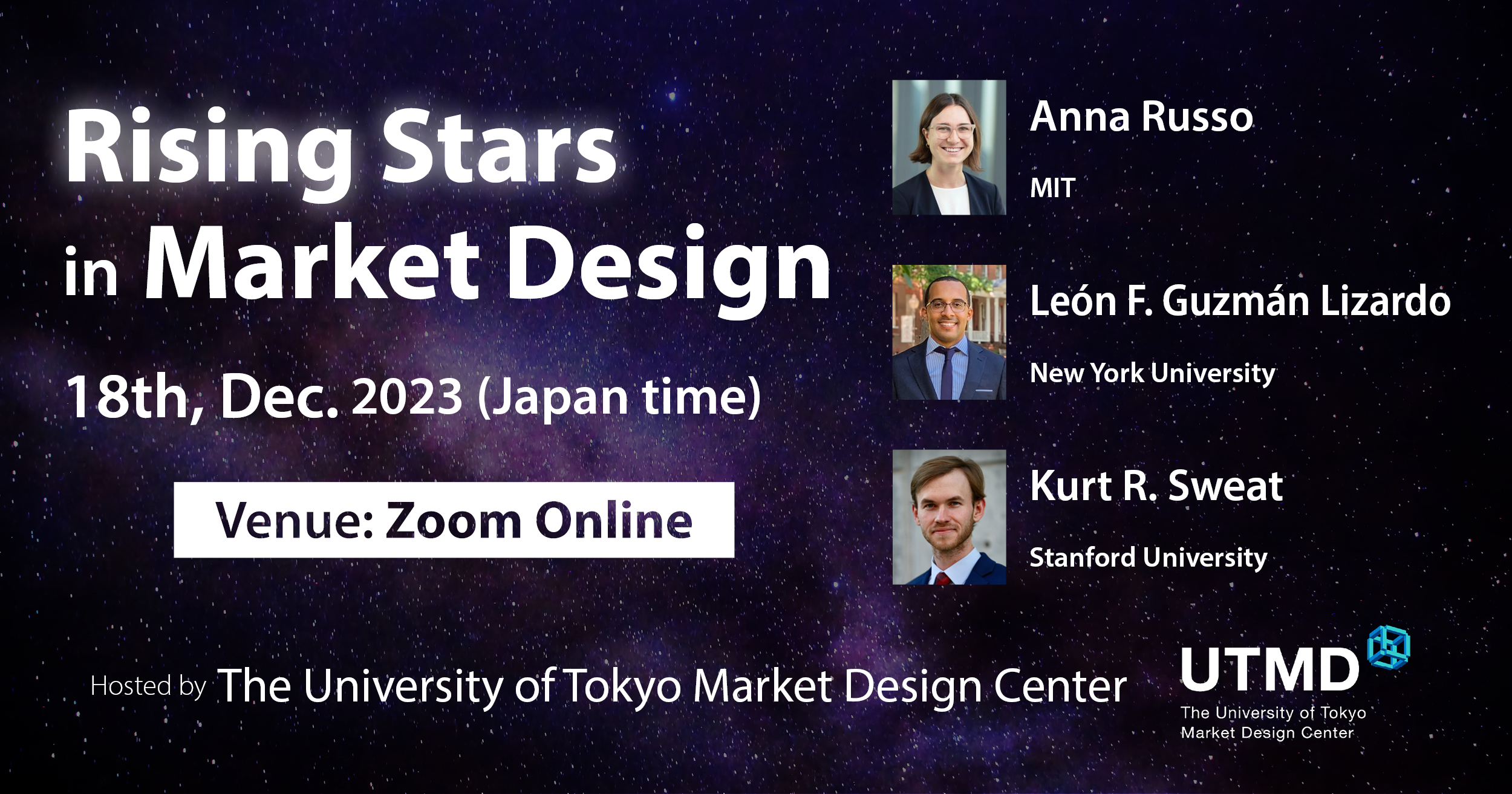(研究者向け)2023-24 Rising Stars in Market Design

UTMDは、12月18日に2023-24 アカデミックジョブマーケットに参加する若手研究者による国際ワークショップ “2023-24 Rising Stars in Market Design” を開催いたします。
開催概要
日時:2023年12月18日(月)午前9:00~12:20 日本時間 (JST)
開催方法:Zoomを使ったオンライン(事前登録制)開催となります。
言語:英語
*撮影や録画はご遠慮ください。
*参加URLを他の方と共有することはお控えください。
参加登録
こちらのリンクから事前登録をしてください。
参加登録URL
*UTMD seminar seriesと同じURLです。
スケジュール
プログラム
Anna Russo (Massachusetts Institute of Technology)

Date & Time: 2023/12/18 (Mon) 9:00-10:00am (JST)
Title: Additionality and Asymmetric Information in Environmental Markets: Evidence from Conservation Auctions with Karl M. Aspelund.
Abstract: Market mechanisms aim to deliver environmental services at low cost. However, this objective is undermined by participants whose conservation actions are not marginal to the incentive — or “additional” — as the lowest cost providers of environmental services may not be the highest social value. We investigate this potential market failure in the world’s largest auction mechanism for ecosystem services, the Conservation Reserve Program, with a dataset linking bids in the program’s scoring auction to satellite-derived land use. We use a regression discontinuity design to show that three of four marginal winners of the auction are not additional. Moreover, we find that the heterogeneity in counterfactual land use introduces adverse selection in the market. We then develop and estimate a joint model of multi-dimensional bidding and land use to quantify the implications of this market failure for the performance of environmental procurement mechanisms and competitive offset markets. We design alternative auctions with scoring rules that incorporate the expected impact of the auction on bidders’ land use. These auctions increase efficiency by using bids and observed characteristics to select participants based on both costs and expected additionality.
León F. Guzmán Lizardo (New York University)
 Date & Time: 2023/12/18 (Mon) 10:10-11:10am (JST)
Date & Time: 2023/12/18 (Mon) 10:10-11:10am (JST)
Title: Matching Students and Professors in Higher Education
Abstract: In higher education, various assignment rules exist for pairing students with course professors, ranging from simple random assignment approaches to mechanisms that grant students considerable choice. How do these contribute to learning and the efficient use of instruction inputs? This paper develops an econometric framework to estimate student-professor match effects, and uses the framework to evaluate how students’ choice over instructors contributes to learning. I extend the literature on teacher value-added by showing how to use sequences of subject-related courses to non-parametrically identify instructor-specific learning production functions when instructors differ in both their grading policies and teaching abilities. The framework accommodates endogenous course selection, course dropout, and discrete scoring, all ubiquitous in higher education. Using post-secondary academic records, I estimate the model and document the existence of substantial student-professor match effects. However, when allowed to choose, students do not always select the instructor from whom they will learn the most; they place as much weight on expected grades. Relative to the current assignment rule, assigning students to the predicted learning-optimal instructor leads to increases in academic achievement and reductions in the course dropout rate.
Kurt R. Sweat (Stanford University)

Date & Time: 2023/12/18 (Mon) 11:20am-12:20pm (JST)
Title: Endogenous Priority in Centralized Matching Markets: The Design of the Heart Transplant Waitlist
Abstract: Centralized matching markets that prioritize specific participants to achieve certain policy goals are common in practice, but priority is often assigned using endogenous characteristics of participants. In the heart transplant waitlist in the United States, the treatment that a patient receives is used to assign waitlist priority. Policymakers recently changed the prioritization in an attempt to reduce waitlist mortality by assigning higher priority to patients receiving specific treatments previously associated with high waitlist mortality. First, I document a significant response to waitlist incentives in treatments given and transplants that take place. Then, I develop and estimate a structural model of treatment and transplant choices to evaluate the effect of the policy change on patients’ outcomes and doctors’ decisions. I find three main results from my model. First, there is little change in aggregate survival, and the effect of the change has been mainly redistributive. Second, the change has effectively targeted patients with lower untransplanted survival, with these patients receiving higher expected survival under the current design. Third, the effect on survival is largely driven by changes in the decision to accept/decline offers for transplants rather than directly due to a change in treatment decisions. The policy implications suggest that future designs of the waitlist should disincentivize declining offers for transplants.
お問い合わせ
東京大学マーケットデザインセンター (UTMD)
東京大学大学院経済学研究科
メール: market-design[at]e.u-tokyo.ac.jp
電話番号: 03-5841-3441


 English
English